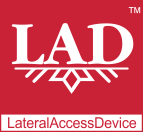
LateralAccessDevice
takes you back to before the Internet
How It Works | Download LAD | Support | LAD Security | Features & Uses | Resources | Members | User Guide
We Don't Have Any Hackers in North Dakota!It is a misperception to believe that only the government and large corporations are under attack by hackers, or that smaller organizations only have trouble with hacking when someone has a beef with them. Though there are stories in the news about disgruntled ex-employees getting back at their former employers by disordering their computer systems, it really is not the norm. In fact, smaller businesses are likely more affected by indiscriminate broad-based attacks than larger organizations. With their less sophisticated equipment and smaller IT budgets, they are the lower-hanging fruit. The truth is, hackers are out to get any computers they can, whether in North Dakota or Timbuktu, the quote from which the above title was derived notwithstanding. Most hack attacks are broad-based fishing expeditions, putting a lot of lures out there to see if they get any bites (bytes?). The worldwide connectivity provided by the Internet has rendered geographic location rather meaningless — the only way geography can make a difference is its presences or absence of the Internet. So, North Dakotans, you do have to worry about cybersecurity just as much as the rest of us. Even if a computer has absolutely nothing on it and is never used for anything but watching cute cat videos, but is merely on and connected to the Internet, it has value to a hacker. Its raw computing power and Internet connection present a valuable resource to any malicious actor who can take it over to further their own ends (that is why even so-called "smart" appliances, like refrigerators, get hacked — it's not because hackers concern themselves with how healthily we eat!). With a computer's raw computing power and Internet connection, a hacker can, among other things:
If the computer is used for any communications, financial transactions or business, it adds yet another layer of value to hackers, beyond its computing power. In this case the hackers can, among other things:
The take away? Everyone in all fifty states and worldwide should take care in how they handle their email, their web-browsing and their computer networks, from the home user to the corporation. LAD provides a way for any user to increase computing security and privacy with its host of practical networking tools, including local access control, blacklisting, DNS logs, packet capture and domain-based filters. Download LAD | Learn More About LAD | LAD for Home | LAD for Business | DIY VoIP PBX
|